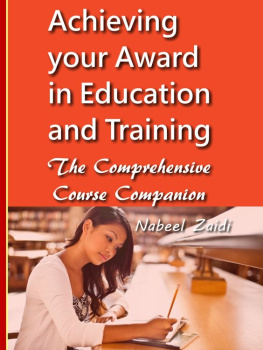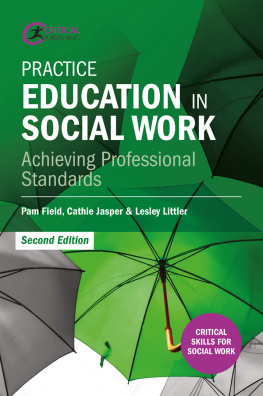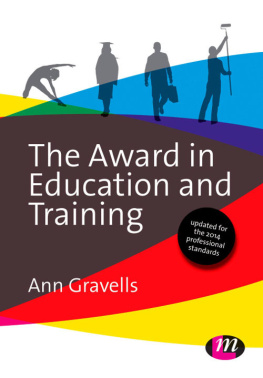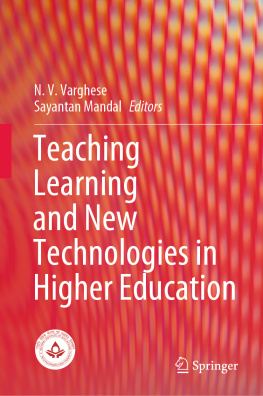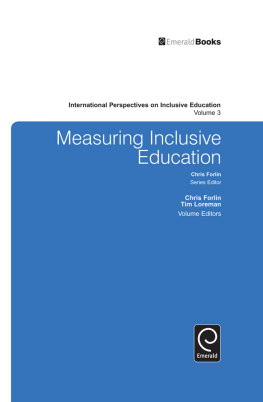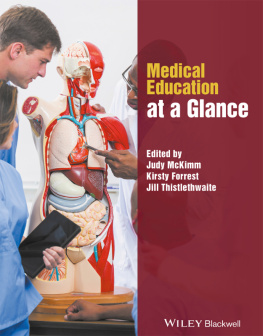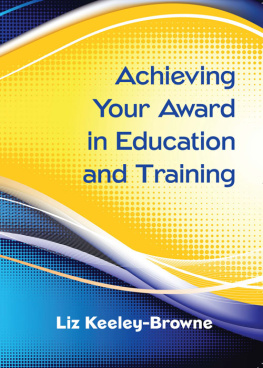Achieving your Award
in Education and Training
The Comprehensive Course Companion
Nabeel Zaidi
LLB (Hons), LLM, Pg.Dip. DMS, MBA, Cert. Ed., Barrister
Copyright Nabeel Zaidi, 2015
First edition published in 2015
The moral right of Nabeel Zaidi to be identified as the author of this work has been asserted by him in accordance with the Copyright, Designs and Patents Act 1988.
All rights reserved. No part of this publication may be reproduced, stored in a retrieval system, or transmitted in any form or by any means, electronic, mechanical, photocopying, recording, or otherwise, without the prior permission of the copyright owner of this book.
About this book
This book provides all the information needed to ensure you pass the Award in Education and Training qualification first time. It has been designed specifically for the Award in Education and Training and is directly aligned to each of the learning outcomes and assessment criteria for the three units that make up the award . It is suitable for candidates without any previous teaching experience and those already in practice. The textbook adopts a practical approach, is underpinned by experience and research and considers multiple perspectives as a result of the authors wide ranging knowledge and experience of further and higher education sectors.
About the author
Nabeel has been in the further education sector since 1996, occupying various lecturing, middle and senior management and consultancy roles, including working with several awarding organisations, undertaking quality assurance assignments, delivering professional training to the education sector on equality and diversity and the Ofsted common inspection framework and developing and delivering on undergraduate and post-graduate business management programmes and teaching qualifications. He is also a Reviewer for the Quality Assurance Agency (QAA) and runs his own college and consultancy company.
Nabeel holds various academic and professional qualifications and titles, including being a qualified Barrister, an MBA in Educational Management (University of Leicester), a Certificate in Education (Institute of Education), a Post-Graduate Diploma in Professional Legal Skills (Inns of Court School of Law / City University), a Masters degree in Law (University College London), a degree in Law (Queen Marys College, University of London), and a Post-Graduate Diploma in Management Studies.
Cont ents
How to use this textbook
This textbook covers all three units of the Award in Education and Training. It is therefore divided into three parts, each part covering a unit of the qualification. Each unit is divided into awarding organisation learning outcomes and assessment criteria, with similar headings.
When you are completing your assessments, make sure that you look at the relevant headings in this textbook that align to the assessment criteria in your assignment tasks or worksheets. You should also be clear about the meaning of each command verb used by the unit assessment criteria. This book contains suggested meanings of command verbs for each of the units.
There is a glossary of terms at the end of this textbook, which you should find useful when reading through the textbook.
UNDERSTANDING ROLES, RESPONSIBILITIES AND RELATIONSHIPS IN EDUCATION AND TRAINING
Introduction
Understanding Roles, Responsibilities and Relationships in Education and Training is a mandatory unit of the Award in Education and Training.
Definition of roles for the purposes of this textbook:
Role | Definition |
Lecturer/Teacher/ Trainer/Tutor/Assessor | the person taking the Award in Education and Training qualification. |
Learner/Student | the person being taught or assessed by the Lecturer/ Teacher/Trainer/Tutor/Assessor. |
AET Tutor | the person delivering/facilitating the Award in Education and Training qualification. |
The teaching role and responsibilities in education and training
1. The teaching role and responsibilities in education and training
(a) Lecturer
Lecturers normally work in Further Education colleges, higher education institutions and private colleges. The extent of the role can be very prescriptive or very wide ranging, with additional responsibilities, depending on the size, type or ethos of the organisation. That aside, there are some common elements. These can include planning, preparing and delivering part of a course or the entire course, contributing towards quality assurance, adhering to organisation policies and procedures and awarding organisation requirements (e.g. Pearson, AQA, OCR, City and Guilds, etc).
Planning can include preparing and/or delivering to schemes of work. These outline the unit content of a course to be delivered per week or per session, the assessment objectives being applied, assessment methods and resources to be used and differentiation strategies for each session. Lecturers may also complete lesson plans, which provide more detailed information about the lesson aim(s), lesson objectives, how lesson objectives are going to be assessed, the content to be covered and the teaching, learning and differentiation strategies to be applied.
Where internally assessed courses are being delivered, lecturers may also be expected to design assignment briefs / assessment instruments and internally verify each others assignment briefs before they are issued. Assignment briefs normally include a set of tasks that learners are required to complete to pass part of or the entire unit. Internal verification includes a set of checks that a colleague lecturer (who may or may not be a qualified internal verifier) undertakes to make sure that the assignment brief or assessment instrument is fit for purpose (i.e. it is capable of generating valid, reliable and timely evidence and outcomes ).
Lecturers are expected to be familiar with key organisation policies and procedures, especially those relevant to their role. These can include policies and procedures relating to health and safety, equality and diversity, safeguarding, assessment and internal verification, examinations, invigilation, teaching and learning, assessment malpractice and maladministration, conflict of interest, learner discipline and gifts and bribes. Lecturers normally disseminate information through lectures, presentations, discussions, facilitation of group work and leading on external visits.
(b) Trainer
Depending on the context, the role of a trainer tends to be more versatile than that of a lecturer, often focusing on skills building, presenting complex information in a short timeframe, actively / frequently facilitating team and group working, having a more practical dimension to sessions (e.g. demonstrating techniques) and being more vocationally focused. Trainers often deliver on work-based learning courses, to professional audiences and in workshop contexts. They can also act as coaches and mentors as part of or an extension of the training delivery. They can be engaged on short-term, long-term or one-off sessions and may be responsible for designing, developing and/or delivering bespoke accredited and unaccredited courses.
Trainers may be highly specialised or expert in their area, with professional competency often being more important than academic qualifications. However, in order to be effective, even trainers need to know some basic teaching, learning and assessment techniques and strategies, including structured planning and delivery of training. Where trainers are delivering sessions on clients premises they are expected to abide by both their organisations policies and procedures and observe those of the host client. Management training and highly technical training may be delivered by trainers who are also freelance consultants, providing expert advice and training as part of a portfolio of professional services. Sometimes trainers specialise in delivering training only.

